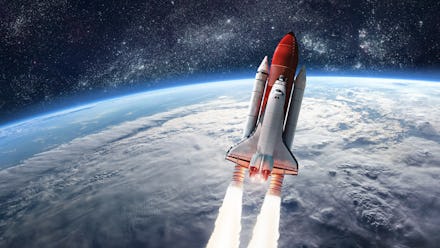NASA just put more than $40 million toward colonizing 'the farthest corners of the universe'

The dreams of tech giants to head into space have been given a bit of a financial boost. Recently, NASA awarded $43.2 million to 14 companies to develop space technology. The amounts given to each company vary, but Blue Origin, founded by Amazon CEO Jeff Bezos, received the most lucrative contract at $10 million.
Each company selected will work on technology to help enable NASA's Moon to Mars program. The first mission, Artemis, hopes to send humans back to the Moon by 2024. After that, NASA aims to head to Mars, and possibly beyond.
The agency's website reads, "NASA’s science, technology and human exploration activities touch every aspect of our lives here on Earth and we want to extend our presence to the farthest corners of the universe. In doing so, we will maintain America’s leadership in space."
Back in July, NASA announced similar partnerships intended to help with its Moon project. Included among the 13 companies mentioned was Blue Origins and SpaceX, whose CEO is Elon Musk.
On the surface, NASA's mission may seem exciting. Not only was Apollo 17 in 1972 our final Moon landing, but it was the last time humans travelled beyond low Earth orbit. However, there's a potentially dangerous undertone to NASA's own description of its mission, further evidenced by the companies involved: space colonization.
NASA's own stated mission to "extend our presence to the farthest corners of the universe" is eerily reminiscent of colonization that's already occurred. Except instead of the limited land on Earth, people are turning their eyes to the vast landscape of space.
In 2002, Musk founded SpaceX with the ultimate goal of "enabling people to live on other planets". Since then, Musk has been very outspoken about his desires to, effectively, ditch this planet.
While speaking to the International Astronautical Congress in Mexico, Musk said, “One [path] is that we stay on Earth forever and then there will be an inevitable extinction event. The alternative is to become a spacefaring civilization, and a multi-planetary species.”
On Saturday, SpaceX finally unveiled Starship, the rocket that's supposed to carry people to Mars. With that reveal, Musk now claims that he'll be able to send people into orbit as early as next year.
Although Bezos doesn't necessarily share Musk's end-goal of leaving Earth for good, he's also interested in colonizing space to save humanity. Except for Bezos, that looks more like sending people into space so its resources can be used to solve problems on Earth.
Both Bezos and Musk turn to a sort of altruism, or the idea that their actions are selfless, to promote their space colonization goals, as noted by The Guardian. But, there is a lot of irony in tech giants like Bezos racing to colonize space while their companies are responsible for harm on Earth.
In September, Amazon employees protested the company's lack of action on climate change. Employees demands included Amazon no longer donates to politicians and lobbying groups who deny climate change. Although Bezos announced a new climate pledge shortly after, Amazon has failed to meet its goals before.
Ultimately, the logics of colonization are not going to save humankind as a whole. As pointed out by 'Don't Let Them Leave: An 'Anti-Space' Zine', "Who benefits from space exploration? Certainly not you. Certainly not the poor. Certainly not the marginalized. Certainly not our planet’s ecosystems."